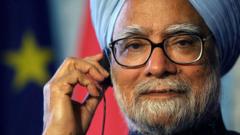The recent passing of Manmohan Singh, India's former prime minister, has prompted a wave of reflections on his legacy as a "kind and soft-spoken politician" who played a critical role in shaping India's modern narrative. His state funeral is set for Saturday, with the government declaring a week-long mourning period in his honor.
Despite a distinguished career that included tenure as the governor of the Reserve Bank of India and federal finance minister, Singh was known for his quiet demeanor, contrasting sharply with many of his more flamboyant contemporaries. Even amidst controversies, including scandals that affected his government, Singh maintained a stoic presence, earning both admiration and critiques.
Supporters praised Singh's focus on prudent policies, particularly the economic reforms introduced during his time as finance minister, which opened up the Indian economy for global trade. His integrity was often highlighted, with colleagues viewing him as a man of the law, dedicated to progress without unnecessary conflict.
Opponents, however, criticized him for his perceived lack of assertiveness, often ridiculing his soft-spoken delivery during important addresses. Yet, many found his humility refreshing in an era dominated by aggressive rhetoric. The former prime minister's stature grew during his leadership, particularly during a period of substantial economic growth.
Singh's personal journey from modest beginnings in present-day Pakistan to a revered political figure is noteworthy. His education at Cambridge and Oxford, combined with his commitment to honest governance, secured him a loyal following among India's middle class. A significant moment came in 2005 when he issued a formal apology for the 1984 anti-Sikh riots, displaying a rare humility that endeared him to many.
His leadership reached a turning point with the historic nuclear agreement with the United States in 2008, a move that fortified India's position on the global stage but drew criticism from various quarters about its potential implications for national policy. Singh's adept handling of the global financial crisis also reinforced his reputation as a stabilizing leader.
However, his second term saw rising corruption scandals and public discontent, culminating in high-profile protests against government inaction on corruption legislation. Singh's handling of these crises, including a delayed response to the brutal gang rape case in Delhi, led to mounting criticism and questions about his effectiveness.
In 2014, announcing he would not seek a third term, Singh expressed confidence that history would view his contributions more favorably than the current discourse. Though he and the Congress party faced significant electoral defeats, his legacy as a leader defined by integrity and quiet strength has left an indelible mark on Indian politics.
Despite facing tremendous challenges during his time in office, Singh's approach and decisions consistently reflected his dedication to fostering a better future for India, even amid personal and political adversity. His story remains a testament to the impact of a leader with a quiet, yet steadfast resolve.





















